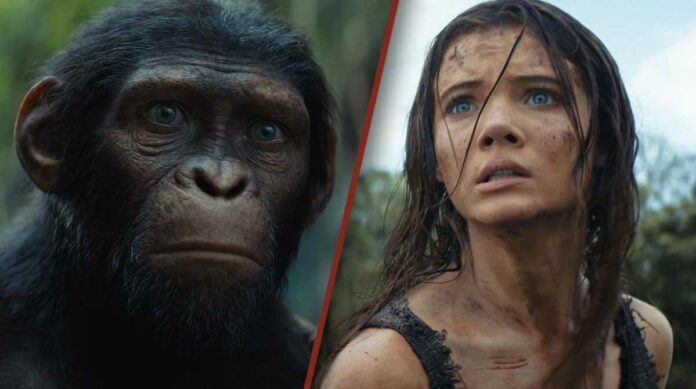It is surprising that, despite being one of the earliest franchises in the history of movies and being constantly successful at that, The Planet of the Apes series isn’t discussed that much among pop culture aficionados. Which is a shame, because the way the original pentalogy of the 1970s grappled with geopolitical issues regarding discrimination, segregation, human and animal rights, religion, and the dangers of nuclear warfare, the franchise was way ahead of its time in terms of modern storytelling from the very beginning. The rebooted trilogy released in the last decade was the finest follow-up the makers could have ever hoped for. It delivered even more nuanced storytelling, and with the brilliant mo-cap conveying the emotions expressed by the apes perfectly to the viewers, it is understandable why it is regarded with such high esteem.
Which is all the more reason why the upcoming continuation of the franchise in the form of Kingdom of the Planet of the Apes has a certain amount of expectation mounted upon it before its release. With the movie being set in the same continuity as the reboot trilogy, it will be interesting to see whether it manages to continue the tradition of surpassing its predecessor or ends up as just another franchise cash grab that has flooded the showbiz. Discussing the recent updates and trailers for the movie, we will share what the audience can expect from Kingdom of the Planet of the Apes.
The Present State of Apes and Humans
The first two movies of the reboot trilogy chronicled intelligent great apes led by Caesar gaining their liberation from captivity and creating a community and civilization of their own, while Simian Flu originated from the viral drug AZ-113, which decimated the majority of the human population across the world. The same Simian Flu, which gave intelligence to the apes, was responsible for the near obliteration of humankind, and eventually, in the last movie of the trilogy, War for the Planet of the Apes, the virus mutated, causing the surviving humans to devolve into mute and primitive creatures. By the end of the movie, the already-nearly exterminated humankind receives the final blow as their military perishes in the conflict with the renegade militia faction, Alpha-Omega, permanently replacing humans with apes as the dominant species. Caesar takes the ape community to Oasis, and as he draws his last breath in peace, a new era begins for the apes.
Kingdom of the Planet of the Apes is set three hundred years after the events of War for the Planet of the Apes, and as it is revealed from the trailers, much has changed in that duration. Apes have formed their own tribes and cultures, while mute, intellectually devolved humans have resorted to living like wild brutes. This new world is quite similar to the first Planet of the Apes (1968) movie, which showcased a future earth where intelligent apes reign supreme and a handful of surviving humans are forced to spend their lives in servitude. The change in power equation between humans and apes allows for a unique scope for scathing ideological criticism. Additionally, with human civilization gone forever, the remnants of the past, which consist of advanced technology or even nuclear weapons, might serve as interesting plot devices, which was a recurrent topic in the original series as well. The human-ape relationship in both the original and reboot series was one of the most important aspects of the overarching narrative, and it seems like it will gain significance in the upcoming movie as well. The trailers have revealed Mae, a girl who can speak and seems to have regular human-like intellectual prowess, and her presence will be vital in the narrative.
Caesar’s Legacy
The central protagonist of the Planet of the Apes reboot trilogy, the intellectually enhanced chimpanzee Caesar, was given enough character growth through the course of the movies to become one of the most fascinating characters in fiction. From sharing the gift of higher intelligence with his fellow apes to liberating them, providing a sense of identity, and guiding them to a safe haven, Caesar’s place among apes is akin to what legendary inventors or creators are to humankind, perhaps even more than that. It goes beyond saying that, despite his obvious absence in the upcoming movie, his presence will be felt by the legacy he has left behind.
As seen from the trailers, a new threat emerges among ape-kind in the form of ape ruler Proximus Caesar, who is revealed to be misinterpreting Caesar’s teachings deliberately to the ape communities in order to assert his absolute dominance and subjugate the remaining humans. On the other hand, a new protagonist, a young chimp named Noa, will be the focus of the upcoming movie. Many speculate that Noa is the descendant of Caesar. However, to know that for certain, we have to wait for the movie itself. What we can say for certain is that the past human-ape relationship will have a lingering effect on this new ape-dominated world, and it will be exciting to see the extent of the reboot trilogy continuity in the new movie.
The upcoming movie will try to bridge the gap between the original and rebooted series of Planet of the Apes, but at the same time, it will retain its originality through a worldview that is different from both its predecessors. With the trailer and released clips looking interesting and immersive enough, there is a fair chance that Kingdom of the Planet of the Apes turns out to be a rare success among original sci-fi narratives.

